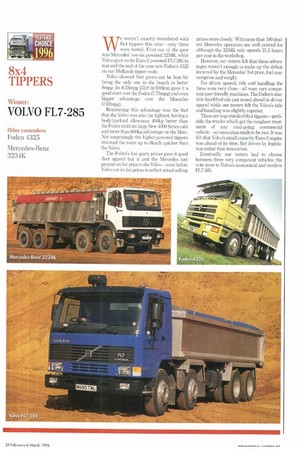8x4 TIPPERS
Page 29

If you've noticed an error in this article please click here to report it so we can fix it.
Winner:
VOLVO FL7-285
Other contenders:
Foden 4325 Mercedes-Benz 3234K
We weren't exactly inundated with 8x4 tippers this year—only three were tested. First out of the gate was Mercedes' vee-six powered 3234K, while Volvo gave us its Euro-2 powered F1,7-285 to test and the end of the year saw Foden's 4325 on our Midlands tipper route.
Volvo showed that green can be lean by being the only one in the bunch to better 8mpg. Its 8.33mpg (33.9 lit/100km) gave it a good start over the Foden (7.75mpg) and even bigger advantage over the Mercedes (7.62mpg).
Reinforcing this advantage was the fact that the Volvo was also the lightest, having a body/payload allowance 4(X)kg better than the Foden (with its large New 4000 Series cab) and more than 600kg advantage on the Mere. Not surprisingly the higher-powered tippers stormed the route up to 6km/h quicker than the Volvo.
The Foden's low parts prices gave it good fleet appeal but it and the Mercedes lost ground on list price to the Volvo —even before Volvo cut its list prices to reflect actual selling prices more closely. With more than 100 dealers Mercedes operators are well catered for although the 3234K only spends 21.3 hours per year in the workshop.
However, our testers felt that these advantages weren't enough to make up the deficit incurred by the Mercedes' list price, fuel consumption and weight.
For driver appeal, ride and handling the three were very close—all were very competent user-friendly machines. The Foden's sizeable facelifted cab just nosed ahead in driver appeal while our tasters felt the Volvo's ride and handling was slightly superior.
These are bog-standard 8x4 tippers—probably the trucks which get the roughest treatment of any road-going commercial vehicle—so innovation tends to be rare. It was felt that Volvo's small-capacity Euro-2 engine was ahead of its time, but driven by legislation rather than innovation.
Eventually our testers had to choose between three very competent vehicles: the vote went to Volvo's economical and modern FI,7-285.




































































































